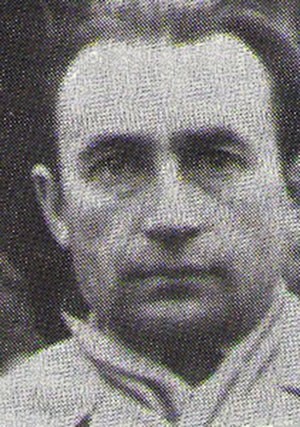
Moisei Vaitsman
Moisei Vaitsman was born in 1922 in Vilna, which at this time was part of Poland. His father Faivl, a furrier, died when Moisei was an adolescent. The son began to work at a factory as an electrician. After the Soviets occupied Lithuania in 1940, and Vilna, that had become the Lithuanian capital in 1939, they transferred the factory to Minsk. Reluctant to lose this job, Moisei also moved to Minsk, with his mother and two younger brothers, and took Soviet citizenship. In March 1941 Moisei was drafted into the Red Army.
Due to the beginning of Operation Barbarossa in June 1941, Moisei did not finish his military training. Together with his training unit, he was evacuated to the Moscow Region and, as a former electrician, was assigned to an engineering battalion, where he became a sapper. With this specialty, Moisei Vaitsman took part in the defense of Moscow. In 1942 his battalion was transferred to Voronezh, south Russia, where the Germans resumed its offensive. Despite the fact that he was a sapper, more than once, Moisei took part in combat fighting as a common foot soldier. At the beginning of 1943, during the Battle of Stalingrad, Vaitsman was seriously wounded and there was a danger that his leg would have to be amputated. After a long stay in hospital, he was declared unfit for combat service and sent to Kazakhstan to guard a Gulag camp.
There Vaitsman's service continued for two months. After that, he was summoned to the political commissar (zampolit) of his security unit and the following dialogue took place:
"Were you born in Vilna?"
"That's right!"
"As a native of Lithuania you are going to [be sent to] Balakhna, to the Lithuanian national division, we have an order – to send all Lithuanians who are released from hospital only to them!"
"Vilna has always been a Polish city, and I do not want to go there. Furthermore, I do not know the Lithuanian language. Send me to any infantry unit"
"If you do not go to the Lithuanian division, you will be court-martialed!"
Thus, Private Vaitsman became one of the many Jewish soldiers of the 16th Lithuanian Division. Despite the fact that Jews constituted about 30 percent of its men, antisemitism was far from nonexistent in this division. As Vaitsman recalled: "I had enough knowledge of the Lithuanian language to understand what one Lithuanian sergeant was telling his comrade, pointing at us with a nod of his head: 'Look, how many Yids are still alive. It's a pity that the Germans did not get rid of all of theml'....''1 Vaitsman also noted that, upon hearing this, one of his comrades, "a young Jewish man, jumped up and assaulted the sergeant and beat him forcefully while shouting 'despicable fascist.' [And] no one moved to defend the anti-Semite.'' 2
During the following year Moisei laid mines along the potential route of enemy tanks and cleared enemy mines. Every day he faced the danger of being killed by an explosion or being captured by the Germans, behind whose lines he had penetrated. More than once, he was forced to fight against enemy sappers, who were carrying out tasks like his. He was awarded the Order of the Patriotic War.
In the summer of 1944, Vaitsman was seriously wounded again and his leg was amputated. After being released from hospital, Vaitsman returned to Vilnius, hoping that he would be able to find at least one of his relatives. However, only his brother Israel was alive – he had succeeded in leaving Minsk in June 1941 and had served with the same Lithuanian Division. Their mother and youngest brother perished in the Minsk ghetto. Their grandfather, a blacksmith, was denounced to the Germans by his former Lithuanian worker and was shot.
In 1954 Moisei Vaitsman repatriated to Poland, and, in 1957, immigrated to Israel.
- 1. An interview published in the collection by Artiom Drabkin and Aleksandr Brovtsyn, Sapior oshibaietsia odin raz, 2012.
- 2. Road to Victory: Jewish Soldiers of the 16th Lithuanian Division 1942-1945, ed. Dorothy Leivers. Bergenfeld , NJ: Avotaynu, 2009, p. 36.






